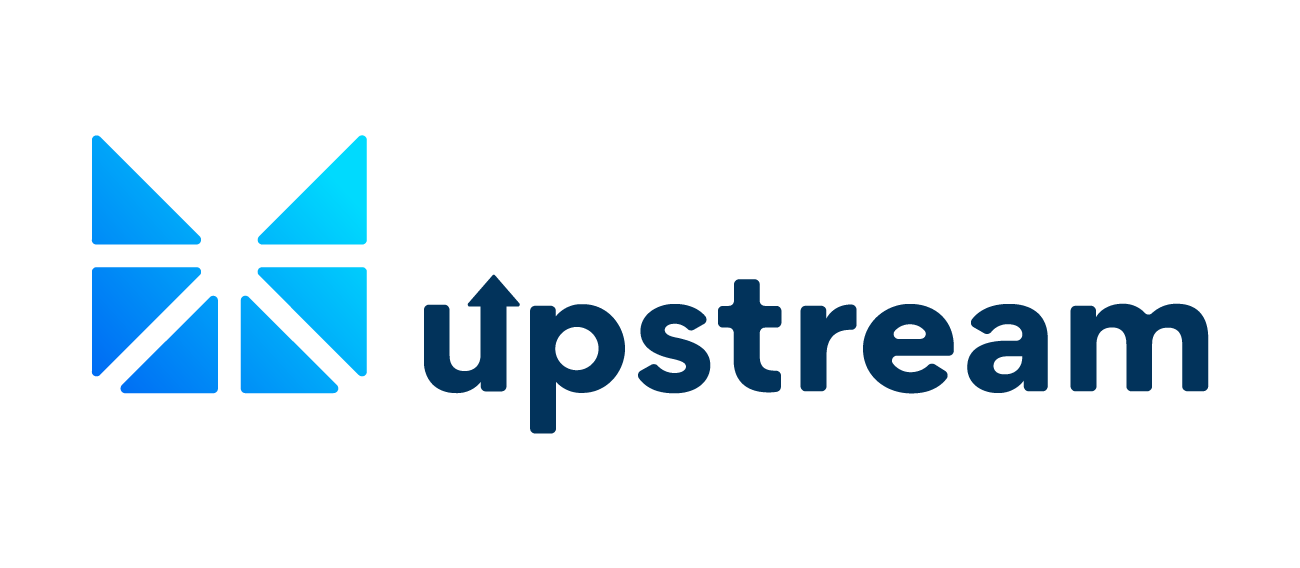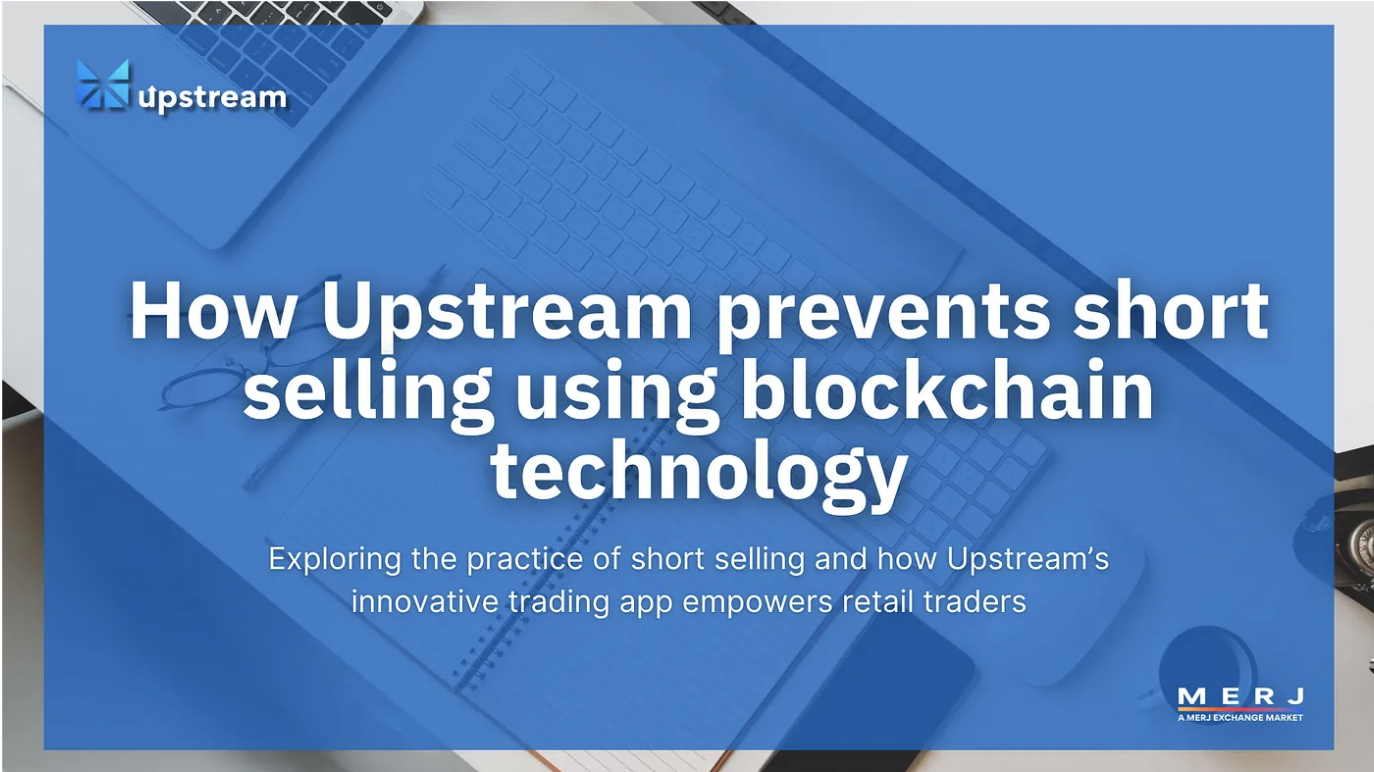
By Anastasia Samaras
What is short selling?
Short selling is an investment or trading strategy that speculates on the decline in a stock or other security’s price.¹ It involves borrowing shares from a broker and selling them at the current market price. Later, the investor buys back the shares at a lower price and returns them to the broker, pocketing the difference as profit.
Naked shorting is the illegal practice of short-selling shares that have not been affirmatively determined to exist. Such practices can unfairly impact capital formation for issuers.
How does Upstream combat short selling?
Upstream, a MERJ Exchange market, is the first regulated market powered by blockchain to offer both securities and NFT trading.
Upstream features public orderbooks that transparently display all best bids and offers for everyone to see. Trading-pairs are quoted, traded, and immediately settled exclusively against the exchanges’ 100% collateralized U.S. dollar stablecoin, backed 1-for-1 with users’ deposits of U.S. Dollar fiat currency.
By leveraging smart-contract technology, Upstream works to level the playing field for retail investors helps to prevent market manipulation, and provides traders with a more secure and reliable trading experience. Notably, Upstream also does not sell its client order flow.
Why does it matter?
The stock market is supposed to be a marketplace with fair commerce, allowing speculators and investors to bet on investments going up or down without the fear of manipulation. It is supposed to be a fair and orderly marketplace where market participants follow legally binding rules that are supposed to be enforced by the regulators. A marketplace where issuers can raise money for their companies and, when a company performs well with its revenue and earnings, sees an increase in the value of their stock that reflects that growth; and where, conversely, if a company is underperforming fundamentally then its stock price will decrease. A place where bullish investors could buy a share they wish to own or bearish speculators sell short a share they have borrowed. Alas, this is not how the stock market operates today.
Unfortunately, professional traders have realized that they have the freedom to not play by the rules, selling shares short they did not borrow (naked shorting) and, in many instances, selling shares that aren’t confirmed to even exist, thereby selling millions more shares that are even in the company’s capitalization. Small cap. issuers have been victims of naked short selling for years, a practice that artificially drives the stock price down and impacts both a stock’s liquidity and a company’s ability to raise new capital at a fair valuation. This is because the unchecked ability to nakedly sell shares short, without the remotest possibility of delivering the shares, introduces illegal price manipulation and artificially increases a stock’s liquidity to the downside.
In 2020 we saw the little guy stand up to the professionals with rallying cries from WallStreetBets and with the assault on the hedge funds in Game Stop, AMC, and others. But that was short-lived and eventually new shorts were created and ultimately the manipulation continues to this day.
How does the blockchain fall into this?
Blockchain technology has the potential to level the playing field for all participants, where there can be no centralized backroom deals, where decentralized code is employed which, in turn, creates efficiencies in the market allowing:
- Transparency: Blockchain offers public orderbooks with transparency. All orders are immutable and display true volume, not trades that print sometimes 3 times over giving a false view of total volume;
- No Market Manipulation: Blockchain prevents manipulation like layering, spoofing, iceberg orders, and wash trading all enforced by Ethereum smart contract technology. In addition, no naked short selling, since only actual shares are displayed and maintained on a blockchain;
- Increased Security: One of the greatest benefits of blockchain is the absence of any single point of failure. When transactions are approved, they are encrypted using proven cryptography algorithms and linked to previous transactions. Every transaction is recorded and shown to the public, in real-time. This information is stored across multiple computer nodes, instead of a centralized single server, which makes it difficult for hackers to attack;
- Reduction in Settlement Periods: The time it takes between the execution of a trade and delivery of the shares and monetary consideration, i.e., the settlement period, in traditional finance is currently T+2 (trade date plus 2 days). Blockchain smart contracts drastically reduce this period to be instantaneous, this is performed using a smart contract atomic swap;
*Atomic swaps are automated, self-enforcing contracts that allow peer-to-peer trading without a trusted third party.²
- Faster Payments: Since trades are settled immediately, global payments that require multiple regulatory checks and lengthy settlement cycles are reduced using blockchain which relies on cryptographic public keys to identify the transacting parties. In addition to settling stablecoin backed by fiat, payments may also be made using various cryptocurrencies;
- Shareholder Actions: The current shareholder proxy system is expensive and inefficient, requiring a manual mailing process. Blockchain smart contracts allow instantaneous voting for shareholder actions electronically potentially saving tens of thousands of dollars for Issuers.
Market participants have begun exploring the idea of utilizing blockchain for securities trading. NASDAQ OMX, the company behind the NASDAQ stock exchange, is testing a system that uses blockchain technology to oversee stock trades on a separate market solely for private companies. In 2022, the Boston Security Token Exchange (BSTX), a national exchange, obtained regulatory approval from the Securities and Exchange Commission to use blockchain technology to offer faster trade settlement.
Compared to a traditional exchange where it typically takes two days to settle a trade, BSTX will offer same-day and next-day settlements. It will also use its private blockchain to offer a market feed to allow members to see their own trades, as well as those of others, on an anonymous basis. Also, the Depository Trust & Clearing Corporation (DTCC), an industry-owned and governed financial market utility, believes blockchain technology represents a generational opportunity to re-imagine the post-trade infrastructure and has been building a settlement system using blockchain.³ We believe that having DTCC buy into blockchain will pave the way for the capital markets to utilize blockchain for traditional exchanges.
More on Upstream
Upstream, a MERJ Exchange Market. Powered by Horizon’s Ethereum layer-2 blockchain technology suite, Upstream offers the primary and dual listing capability to NASDAQ, NYSE, and over-the-counter (OTC Markets) issuers, as well as international stock exchanges including EuroNext, ASX, NSX, TSX, and CSE.
Upstream/MERJ is an affiliate of the World Federation of Exchanges (WFE), recognized by HM Revenue and Customs UK, a full member of the Association of National Numbering Agencies (ANNA), and a Qualifying Foreign Exchange for OTC Markets in the U.S. MERJ is also a member of the Sustainable Stock Exchanges Initiative.
Listing on Upstream grants issuers access to a global, digital-first, investor base which can now trade U.S. and international equities on the Upstream smartphone app using USDC digital currency, credit card, debit card, PayPal, or USD. The Upstream platform aims to unlock liquidity and enhance price discovery for issuers while giving global investors the opportunity to access and invest in U.S., Canadian, and European companies.
Learn more at https://upstream.exchange/GetListed.
Sources
1 Investopedia | 2 CFI | 3 Reuters |
Disclaimers
This communication shall not constitute an offer to sell securities or the solicitation of an offer to buy securities in any jurisdiction where such offer or solicitation is not permitted.
Upstream and issuers do not charge for share transfers, however, transfer agents may charge investors for share transfers. Such fees are standard in the industry and if a fee is required, the transfer agent will alert the investor of such charges and how to pay via credit card, check or wire.
NFTs have no royalties, equity ownership, or dividends. NFTs are for utility, collection, redemption or display purposes only. Anyone may buy and sell NFTs on Upstream.
*U.S. or Canadian-based citizens or permanent residents may only deposit, buy, or sell securities on Upstream after being introduced by a licensed broker dealer. Note that U.S. or Canadian-based investors include those U.S. or Canadian citizens who may be domiciled overseas.
Upstream is a MERJ Exchange market. MERJ Exchange is a licensed Securities Exchange, an affiliate of the World Federation of Exchanges, a National Numbering Agency and member of ANNA. MERJ supports global issuers of traditional and digital securities through the entire asset life cycle from issuance to trading, clearing, settlement, and registry. It operates a fair and transparent marketplace in line with international best practices and principles of operations of financial markets. Upstream does not endorse or recommend any public or private securities bought or sold on its app. Upstream does not offer investment advice or recommendations of any kind. All services offered by Upstream are intended for self-directed clients who make their own investment decisions without aid or assistance from Upstream. All customers are subject to the rules and regulations of their jurisdiction. By accessing the site or app, you agreed to be bound by its terms of use and privacy policy. Company and security listings on Upstream are only suitable for investors who are familiar with and willing to accept the high risk associated with speculative investments, often in early and development stage companies. There can be no assurance the valuation of any particular company’s securities is accurate or in agreement with the market or industry comparative valuations. Investors must be able to afford market volatility and afford the loss of their investment. Companies listed on Upstream are subject to significant ongoing corporate obligations including, but not limited to disclosure, filings, and notification requirements, as well as compliance with applicable quantitative and qualitative listing standards.
Forward-Looking Statements
This communication contains “forward-looking statements.” Such statements may be preceded by the words “intends,” “may,” “will,” “plans,” “expects,” “anticipates,” “projects,” “predicts,” “estimates,” “aims,” “believes,” “hopes,” “potential,” or similar words. Forward-looking statements are not guarantees of future performance, are based on certain assumptions, and are subject to various known and unknown risks and uncertainties, many of which are beyond the Company’s control, and cannot be predicted or quantified, and, consequently, actual results may differ materially from those expressed or implied by such forward-looking statements. Such risks and uncertainties include, without limitation, risks and uncertainties associated with (i) difficulties in obtaining financing on commercially reasonable terms; (ii) changes in the size and nature of our competition; (iii) loss of one or more key executives or brand ambassadors; and (iv) changes in legal or regulatory requirements in the markets in which we operate. The Company assumes no obligation to publicly update or revise its forward-looking statements as a result of new information, future events or otherwise.

